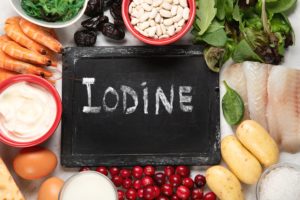 Iodine is a mineral found in the ocean and soil of the Earth. Although the human body doesn’t produce iodine on its own, it’s necessary for your health and wellbeing.
Iodine is a mineral found in the ocean and soil of the Earth. Although the human body doesn’t produce iodine on its own, it’s necessary for your health and wellbeing.
Understanding the importance of iodine can help you prevent iodine deficiency and the associated complications.
Why Does The Human Body Need Iodine?
Iodine is essential to the thyroid gland’s ability to produce hormones. Thyroid hormones manage various bodily functions, including metabolism, growth, and development.
Sources of Iodine
Since the body doesn’t produce iodine, it needs to be consumed as part of your diet.
Iodine naturally exists in certain foods, including fish, shrimp, seaweed, and dairy products. You can also consume iodine through iodized salt.
People who don’t get enough iodine in their diets can consider iodine supplements. Dietary iodine supplements are typically found in the form of sodium iodide or potassium iodide. Make sure to consult a physician before starting an iodine supplement.
Complications of Iodine Deficiency
If you’re not getting enough iodine in your diet, you may experience symptoms including:
- Swollen thyroid glands in the neck
- Hypothyroidism is an endocrine disorder resulting from low thyroid hormone levels
- Symptoms of hypothyroidism may include fatigue, constipation, weight gain, cold sensitivity, dry skin, muscle weakness, depression, and thinning hair
- Cognitive problems, such as difficulty learning, low IQ, and mental disability (namely in kids)
When iodine deficiency is left untreated, it can cause severe hypothyroidism and complications such as:
- Heart disease and related heart conditions
- Peripheral neuropathy
- Mental health problems, including cognitive impairment and depression
- Impaired ovulation in women, can cause infertility
Pregnant women need approximately 50% more iodine than non-pregnant women to support the growing fetus. Iodine deficiency in pregnant women can trigger complications including:
- Stillbirth
- Miscarriage
- Preterm delivery
- Birth defects
The physicians at The Center for Natural and Integrative Medicine can diagnose and treat iodine deficiency with an integrative approach. Contact us today to schedule an appointment!

